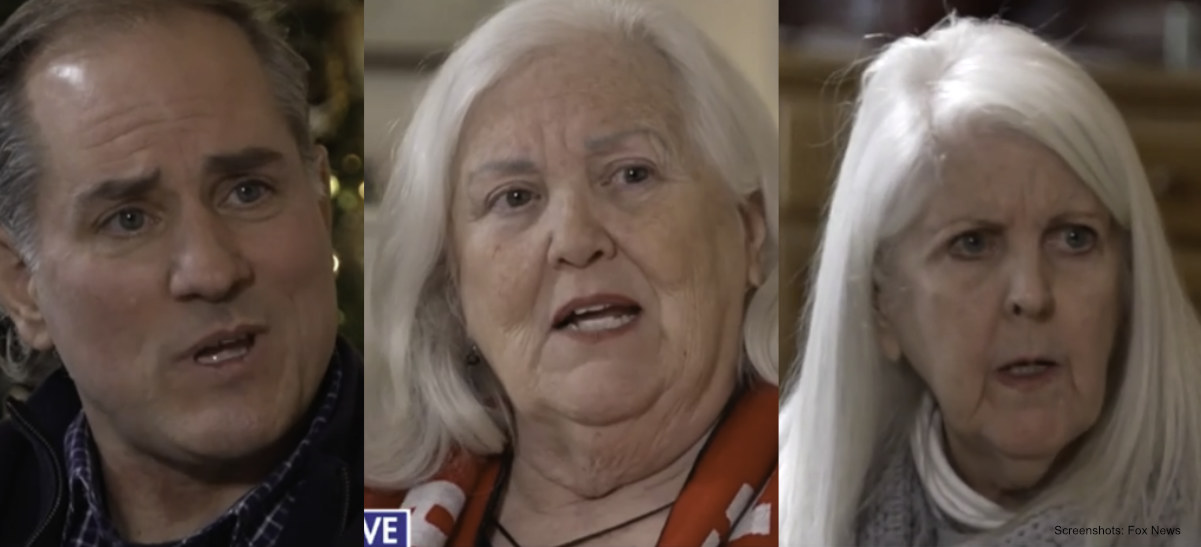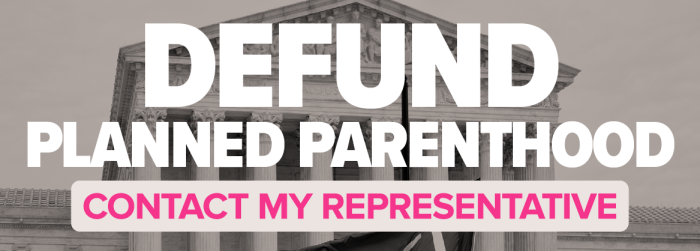Three pro-life activists who received pardons from President Trump on January 23 recently spoke with Fox News ‘Outnumbered’ host Kayleigh McEnany about their experiences.
Will Goodman, Paulette Harlow, and Jean Marshall (who is Harlow’s sister) joined McEnany, along with Harlow’s husband John. Goodman, Harlow, and Marshall were all present at the late-term abortion facility Washington Surgi-Clinic in Washington, D.C., on October 22, 2020. Video footage shows them and six other pro-life activists singing “Ave Maria” inside the abortion facility while sitting in chairs.
They are said to have used chains, bike locks, furniture, and their bodies to prevent abortions from being committed — all common and historic non-violent acts of protest. The pro-lifers, however, were accused of acting violently, were arrested, and were charged with violating the Freedom of Access to Clinic Entrances (FACE) Act and conspiracy against rights. “These defendants conspired to use force to prevent fellow citizens from exercising rights protected by law,” claimed U.S. Attorney Matthew Graves for the District of Columbia in a press release. “People cannot resort to using force and intimidation to prevent others from engaging in lawful activity simply because they disagree with the law.”
Weaponization of the law
“The thing is, there is absolutely no violence,” Harlow told McEnany. “I have been in the pro-life movement for a long time. I have never ever, ever seen any violence on the part of pro-life people.”
Complaints from both the pro-lifers and pro-life legislators have alleged that laws were weaponized against pro-lifers specifically in retaliation for the Supreme Court’s decision to overturn Roe v. Wade. For instance, the conspiracy against rights charges stemmed from the Ku Klux Klan Act of 1871, known as an “Act to enforce the Provisions of the Fourteenth Amendment to the Constitution of the United States, and for other Purposes,” which was meant to curb racist violence. The FACE Act was made law in 1994 under the pro-abortion Clinton administration.
Goodman told McEnany that both laws were weaponized against pro-lifers.
READ: How Roe’s reversal triggered the Biden-Harris DOJ’s persecution of peaceful pro-lifers
“It was weaponization, like President Trump says, and here they’re using this conspiracy law that they used on Ku Klux Klan – violent – Ku Klux Klan members and racists to use against us when we’re trying to save lives, it’s like totally flipping reality,” he said.
Harlow noted that Attorney General Merrick Garland appeared to be focused on prosecuting peaceful pro-lifers while pro-abortion advocates firebombed and spray-painted pro-life pregnancy centers. He testified that it was tougher to catch the pro-abortion advocates because they were acting “at night in the dark.”
“I was appalled watching Garland,” said Harlow. “He was isolating us and targeting us because of our pro-life stance and especially, he was targeting Catholics and he just went to Congress and lied.”
Targeted for their beliefs
The pro-lifers believe they were targeted for both their pro-life stance and their personal religious beliefs. In fact, Harlow’s attorneys requested permission for her to attend Mass while she was under house arrest, but the federal court would not allow it.
“What I was surprised at is that this was really targeting my religion, my faith, because if they had just given me an ankle monitor, I could go within three miles of my house,” she said. “They just didn’t want me to go to church.”
She added, “There were several things that were said to us. One was that this trial was not about abortion — which was sort of ridiculous, because that’s the reason that we were there — to stop abortions and to love the mothers and the children, but primarily to see if we could intervene and save the life of the babies — and then saving the life of the baby often saves the life of the mother as well.”
Working for His good
Prison life had its share of difficulties for the pro-lifers, but faith is what got them through. As Marshall explained, “[The shackles] felt like razors on my ankles. And nobody told me to wear socks or pants so that they wouldn’t cut into my skin. It felt like my skin was being cut.”
Goodman explained that he was placed in a unit that “had been condemned.”
“We went over two weeks without toilet paper,” he said. “And some of the guys mentioned that some of the men who were there with gender dysphoria, wearing dresses, could get mascara, lipstick, and perfume — but we couldn’t even get toilet paper or basic needs. So there was a lot of neglect.”
Even with the hardships, the imprisoned pro-lifers found positive moments.
In addition, Goodman experienced a terrifying accident — and many, including him, saw his survival as miraculous.
“I was on a high steel top bunk of a bunk bed that’s about five, five and a half feet up and I was saying my prayers in bed and I fell asleep and I managed to roll over in my sleep and go right over the edge of the bed,” he explained. “And I was bleeding quite a bit. I was unconscious, but one of the guards even told me later, when they turned the lights on, it looked like a homicide scene. There was so much blood. But when I came back after 11 hours in the emergency room and some of the Hispanic guys in my unit and others were seeing me, they were making the Sign of the Cross and they were shocked because everyone had thought I had died … God saved me. I believe so.”
Their faith, hope, and optimism got them through until, on January 23, Trump pardoned Goodman, Marshall, and Harlow along with 20 other pro-life activists. Some of those activists were in prison, some had been released, and others were still awaiting their sentences. But all were now free to return to their lives.
Goodman said that when news broke that he was being pardoned, his fellow inmates were excited for him. When he heard that Trump was signing the pardon, he explained, “Well, as fast as I could with my concussion, I made it up the three flights of stairs into the TV room, and there, all the guys were watching Fox News and they said, ‘You just got pardoned!’ And they’re shaking my hand. Sixty guys in the unit all start cheering and applauding, and I was like, this is just a joyful experience and many of the guys in there were full of joy too.”
As for Marshall, despite the hardships she endured as the result of living out her pro-life convictions, she said she is “so thankful to God that He could use me.”








